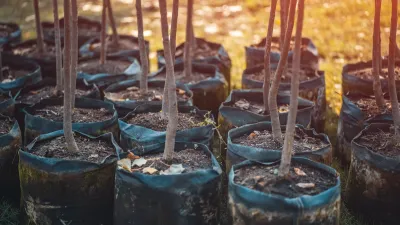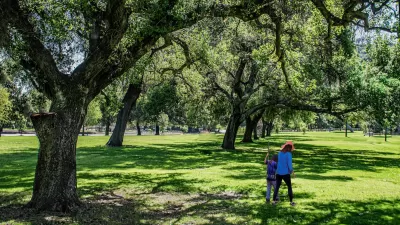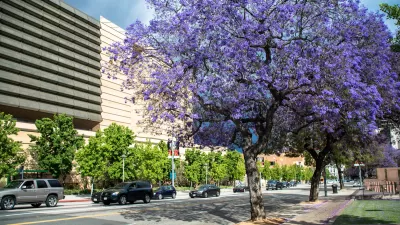New research reveals more of the details of how trees provide therapeutic effects for humans.

Alex Hutchinson writes of the larger implications of a new study published by the journal Scientific Reports into the nature of the therapeutic benefits of trees.
A team of researchers in the United States, Canada, and Australia, led by the University of Chicago psychology professor Marc Berman, collected two large data sets from the city of Toronto, according to Hutchinson, "both gathered on a block-by-block level; the first measures the distribution of green space, as determined from satellite imagery and a comprehensive list of all five hundred and thirty thousand trees planted on public land, and the second measures health, as assessed by a detailed survey of ninety-four thousand respondents."
The study's findings: "an additional ten trees on a given block corresponded to a one-per-cent increase in how healthy nearby residents felt." Berman is quoted directly to add perspective:
'To get an equivalent increase with money, you’d have to give each household in that neighborhood ten thousand dollars—or make people seven years younger,' Berman told me.
A discussion of some of the study's subtler details, however, inspires Hutchinson to muse on large questions, like how the findings relate to a theory proposed by William James in the late 19th century about "voluntary" and "involuntary" attention. Berman's study produces a counter point to recent research identifying the negative effects of the urban tree canopy, as well as a chance for Hutchinson to propose a closer attention to the details of Berman's studies for the purposes of public health benefits.
FULL STORY: How Trees Calm Us Down

Alabama: Trump Terminates Settlements for Black Communities Harmed By Raw Sewage
Trump deemed the landmark civil rights agreement “illegal DEI and environmental justice policy.”

Study: Maui’s Plan to Convert Vacation Rentals to Long-Term Housing Could Cause Nearly $1 Billion Economic Loss
The plan would reduce visitor accommodation by 25% resulting in 1,900 jobs lost.

Planetizen Federal Action Tracker
A weekly monitor of how Trump’s orders and actions are impacting planners and planning in America.

DC Extends Application Window for Outdoor Dining Permits
District restaurants will have until the end of November to apply, but businesses with permits in rush hour parking lanes must end operations on July 31.

Wind Energy on the Rise Despite Federal Policy Reversal
The Trump administration is revoking federal support for renewable energy, but demand for new projects continues unabated.

Passengers Flock to Caltrain After Electrification
The new electric trains are running faster and more reliably, leading to strong ridership growth on the Bay Area rail system.
Urban Design for Planners 1: Software Tools
This six-course series explores essential urban design concepts using open source software and equips planners with the tools they need to participate fully in the urban design process.
Planning for Universal Design
Learn the tools for implementing Universal Design in planning regulations.
Caltrans
Smith Gee Studio
Institute for Housing and Urban Development Studies (IHS)
City of Grandview
Harvard GSD Executive Education
Toledo-Lucas County Plan Commissions
Salt Lake City
NYU Wagner Graduate School of Public Service





























